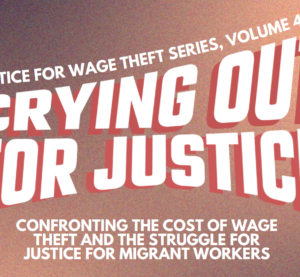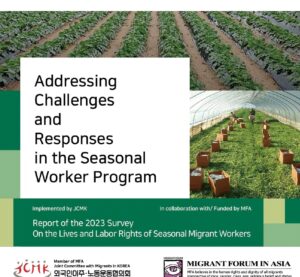PRESS RELEASE: PH to host 5th World Social Forum on Migration
— April 13, 2012
5th World Social Forum on Migration
Secretariat: c/o Migrant Forum in Asia (MFA)
Address: 85-C Masikap Extension, Barangay Central, Diliman, Quezon City 1100, Philippines
Telephone: +63.2.928.2740 | Telefax: +63.2.433.3508 | Mobile: +63.921.540.5063
Website: http://www.wsfm2012.org |Email: mfa@pacific.net.hk
Contact Persons:
William Gois, Migrant Forum in Asia, +63.920.960.0916
Ellene Sana, Center for Migrant Advocacy, +63.917.448.1464
PH to host 5th World Social Forum on Migration
MANILA, Philippines – The World Social Forum on Migration (WSFM) International Committee representatives from the United States of America, Palestine and Philippine-based Asian regional organization announced today that, for the first time, said global event will take place in Asia and will be held in the country on 26-30 November 2012.
In a press conference, they said that hundreds of international delegates are expected to come to the country in November and participate in one of the thematic focuses of the World Social Forum.
According to Migrant Forum in Asia, the technical secretariat of the event, previous WSFMs were held in Europe and Latin America. The fifth WSFM will carry the theme “Mobility, Rights and Global Models: Looking for Alternatives.”
The WSFM aims to strengthen the process, protest movements and organizations around the world fighting for integration and full exercise of rights of men, women, youth, children and girls who migrate after the hope of a dignified and just under one full human development.
The World Social Forum is a space for democratic debate of ideas, reflection, formulation of proposals, exchange of experience and articulation of social movements, networks, NGOs and other civil society organizations opposed to neoliberal globalization and restricting the granting of citizenship and civil rights, political, economic, social and cultural rights of migrants, displaced, refugees and stateless persons.
Activities during the five-day event include workshops, self-organized events, field visits, cultural presentations, and mobilization in solidarity with local workers’ organizations and trade unions.
Meanwhile, Philippine-based organizations expressed concern over issues affecting migrant workers.
Closure of Philippine Embassies
To save the government some P500 million every year, the Department of Foreign Affairs has decided to close at least 10 Philippine embassies and consulates around the world by the end of the year. Among those that are expected to be closed by July 2012 are embassies in Venezuela and Sweden and consulates in Palau, Spain, Ireland and Germany.
Erwin Puhawan of the Kanlungan Centre Foundation Inc. said that Filipinos in Barcelona and Sweden have protested the planned closure, saying they would find it more difficult to renew passports and avail themselves of other consular services.
“Closure of Philippine embassies and consulates in these countries will have impact on Filipinos as this means they will not be have access to services and will need to travel far in order to process their passports, and necessary documents,” said Puhawan. “It will also have impact on overseas absentee voting.”
Migrants in conflict situations
Ellene Sana, executive director if the Center for Migrant Advocacy, said that in times of economic and political upheaval and social unrest, as in the case of global financial crises and uprisings in the Arab World, “migrants are often the most adversely affected, yet we hear little of their struggles.”
“Upheavals and social unrest have put countless numbers of migrants in extremely precarious situations. Migrants became stranded in host countries experiencing significant civil unrest, with little support from their national governments to facilitate their return, and with limited options for repatriation, resettlement or re-migration,” she said.
Sana said that such situations lead to important questions with respect to the obligations of states to protect their nationals abroad, particularly on how to compensate those returning from conflict areas.
“Highly-skilled OFWs know the loan accessing process, while low-skilled workers are not aware of the process. This is an issue of access, discrimination and sustainable reintegration,” she said.
Sana stressed that the vulnerable and those with lesser opportunities should be given particular attention to or at least measures should be adopted that would help them understand the access mechanism.
“The Philippine experience on evacuation, reception, repatriation and reintegration of OFWs trapped in countries where there are emergencies or conflict is nothing new, so the government is expected to be more prepared and better adept to its response in this particular situation,” she said.
ILO Convention I89
Asian Migrants Centre’s Rex Varona said that the Philippines should speed up the process of ratifying the International Labor Organization (ILO) Convention 189 (C189) for Domestic Workers before the anniversary of the adoption of the Convention on June 16. C189 is landmark instrument that recognizes domestic workers as workers who deserve equal labor protection. The convention lays down basic rights and principles at work which should be accorded to both local and migrant domestic workers.
“For C189 to take effect, it should be ratified by two countries in one year after its adoption. While the Philippines has been very vocal about ratifying the Convention, this is yet to be seen. Ratifying the Convention would further benefit the Philippines that sends a large number of domestic workers to almost all parts of the globe. It would increase its bargaining power with destination countries as this would send strong message to destination countries that the Philippines is serious about protecting its own citizens and therefore the same treatment should be given to them when they work abroad,” stressed Varona.



